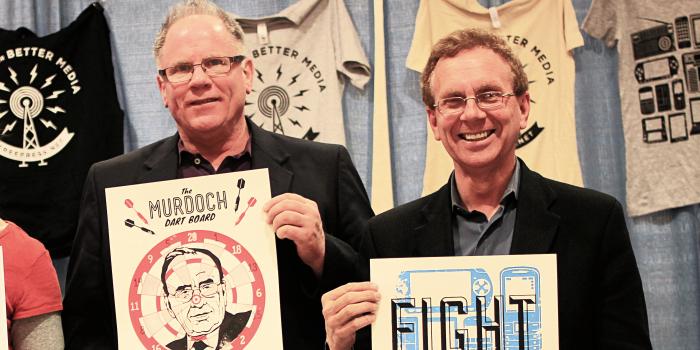Free Press Slams FCC Chairman Pai's Plan to Deny Nondiscrimination Protections to Text Messaging

WASHINGTON — On Thursday, Free Press filed a letter to the Federal Communications Commission condemning Chairman Ajit Pai’s plan to classify wireless text messaging as an “information service” rather than a “telecommunications service” under the Communications Act.
The chairman has scheduled a vote on the issue for the agency’s monthly meeting on Dec. 12. The information-service classification is the same one the Pai FCC wrongly applied to broadband internet-access services in its 2017 Net Neutrality repeal, prompting Free Press and others to sue the agency and appeal that decision in the D.C. Circuit Court of Appeals.
Next week’s vote comes in response to a request for clarity on the legal status of text messaging filed almost 11 years ago by Free Press, Public Knowledge and other public-interest groups. That 2007 petition stemmed from Verizon Wireless’ initial decision to block NARAL’s text-messaging sign-up program, based solely on the wireless company’s determination that pro-choice political messages might be “controversial or unsavory.”
The groups at that time urged the FCC to declare that text-message services were telecom services under Title II of the Communications Act to give texting legal protection against this kind of wireless-carrier discrimination. The FCC has announced its intention to vote the other way at next week’s open meeting, however, with no prior warning, and under the legally and factually false pretense that its decision is necessary to let wireless carriers block spam and other unwanted text messages.
Free Press filed its letter prior to last night’s deadline for submitting comments on the agency’s proposed ruling. In the letter, Free Press Policy Director Matt Wood wrote:
“The Commission has frequently made fatal substantive and procedural errors in its information service classification decisions. It has committed reversible error on numerous occasions, especially when purporting to retain longstanding and vital communications rights while foolishly sweeping away the proper legal framework for such rights.
“Yet before Donald Trump’s unfortunate election, and his disastrous decision to let Ajit Pai serve as the chair, the Commission had been less in the habit than it is now of lying to the public whose interest it is charged to serve.
“The procedural irregularities plaguing this proceeding, the phony justification that the decision would help to combat spam and unwanted messages, and the shoddy legal analysis put forward to support the classification decision, are all alarming. Title II’s mandates do not prohibit telecom carriers from honoring their subscribers’ wishes to filter out unlawful or even unwanted content.
“What’s more, the searingly obvious fact that not every wireless texting service subscriber can afford to or chooses to adopt wireless broadband seemingly escapes the Pai Commission, as the Draft blithely suggests that all ‘[c]onsumers have a wealth of options for wireless messaging service,’ including ‘over-the-top applications.’
“As Free Press research reports and mountains of other evidence show, the individuals least likely to adopt broadband are low-income individuals. They are also disproportionately people of color (at every income level). And they are also more likely to be members of other marginalized and underserved demographic and geographic communities.
“These individuals should not be subject to the whims of wireless carriers’ decisions to block political messages — or, in fact, any wanted messages — when those without broadband cannot simply click over to a different application for their messaging needs.”




